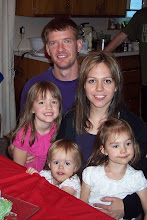Tips and Ideas for Avoiding (or Overcoming) Postpartum Depression
Before my first child was born, I had not given much thought to postpartum depression (PPD). I certainly never thought it would be part of my experience. Yet, it was a defining period in my life (you can read more about my struggle here). Today, I want to offer some tips and ideas to help pregnant and new moms. Please remember, the ideas I share are based on my own experiences. I am not a doctor, so please consult a doctor if you believe you may have postpartum depression.
Be proactive during pregnancy: Statistics say that up to 70% of women will experience the "Baby Blues" after childbirth while 15% of women will go on to experience postpartum depression. If you educate yourself before or during pregnancy, you will be in a better position to get the help you need right away. One of the best things I did while pregnant (the 3rd time) was read a great book by Dean Raffelock entitled A Natural Guide to Pregnancy and Postpartum Health.
Pamper yourself nutritionally: Often, as soon as the baby is born, moms stop eating as healthfully as they did during pregnancy. It is hard to meet all the needs of a newborn and cook nutritious meals, but it is essential! One idea is to prepare and stock your freezer with healthy meals before the baby is born. Also, keep many whole foods on hand for snacking (apples, carrots, almonds, etc.). Try to avoid refined sugars and flour, as these may cause you to feel even more fatigued and have mood swings. Add an omega 3 supplement or eat wild-caught salmon a few times a week. Drink lots of water and continue taking your prenatal vitamin.
Pamper yourself emotionally and spiritually: If you get a free moment or someone is watching the baby, do not do housework! As a friend told me, "Housework can be done in the midst of chaos, but nourishing your soul needs a protected time." Instead of chores, do something to "fill your cup." Read a magazine or book, work on an art project or hobby, listen to music, enjoy a nice hot bath, pray, sleep, etc. The point is to take time for you and do something special for yourself.
Get some exercise (and some sun): There is no doubt it is difficult to squeeze in exercise when you have a new baby. Especially after sleepless nights, the thought of exercising can be daunting. A simple idea is to put the baby in a stroller and take a walk. I would put my two older daughters in a stroller, strap the baby in a front carrier, and walk around the neighborhood. Even though I received many stares and comments, it did wonders in elevating my mood! Enlisting a friend to walk with can also be motivating. An added benefit to walking outside is that you'll fulfill your need for sunlight (to soak up some vitamin D) and exercise at the same time!
Find support: A risk factor for postpartum depression is having a poor or non-existent support system. Having a baby is challenging and it changes your life in so many ways. If your baby has sleep issues or is colicky, you also have a greater chance to suffer. Surround yourself with people who can help and don't be afraid to ask for help. If someone offers to do something, say "thank you" and let them! You don't have to make others think you have it all together. If you're human, you don't! Churches, MOPS groups, and other mother's groups are great places to find support.
Speak out: Please, please, please do not suffer silently. It will take courage, but you must speak out to get the help you need. I wasted so much time and missed so many sweet experiences because I hid in fear and shame. Your child is only a baby once! Don't miss this special time when there are conventional and alternative treatments that can help. Seek out a doctor who will listen to you and consider finding a counselor, a pastor, or a women who has experienced PPD to help you navigate through the experience.
Excellent resources to help you include:
Postpartum Support International is an excellent website about postpartum depression. It can connect you with helpful people and resources.
 The Happiest Baby on The Block DVD
The Happiest Baby on The Block DVD A Natural Guide to Pregnancy and Postpartum Health
A Natural Guide to Pregnancy and Postpartum Health 
If you have any questions or need encouragement, please feel free to contact me here. Next Sunday, I'll finish my series with ideas on how to offer support to moms struggling with postpartum depression.
Labels: Postpartum Depression



2 Comments:
Nice job, Stacie! Moms need to hear about other real moms who have suffered with PPD. Your suggestions are great -- the info and the book/DVD recommendations! There's some evidence that exclusive breastfeeding releases hormones that help with depression, too. And this is waaaay out of a lot of people's comfort zones, but there is also evidence that the placenta contains hormones that hold off PPD very well. (Think placenta capsules. Yeah, I know, way out of the comfort zone.)
Meditation is a powerful tool for women dealing with postpartum depression and other stresses that can follow childbirth. Mommy Meditations, http://www.MommyMeditations.com was developed with the help of Dr. Kerri Parks, ObGyn, who personally battled postpartum depression and the grief of losing her husband days before the birth of her fourth child. Mommy Meditations can help new moms recognize distress and ease into their postpartum bodies. Please check out the website and if you think it's something that could benefit your website visitors, please include it as a resource link.
http://www.MommyMeditations.com
Post a Comment
Subscribe to Post Comments [Atom]
<< Home